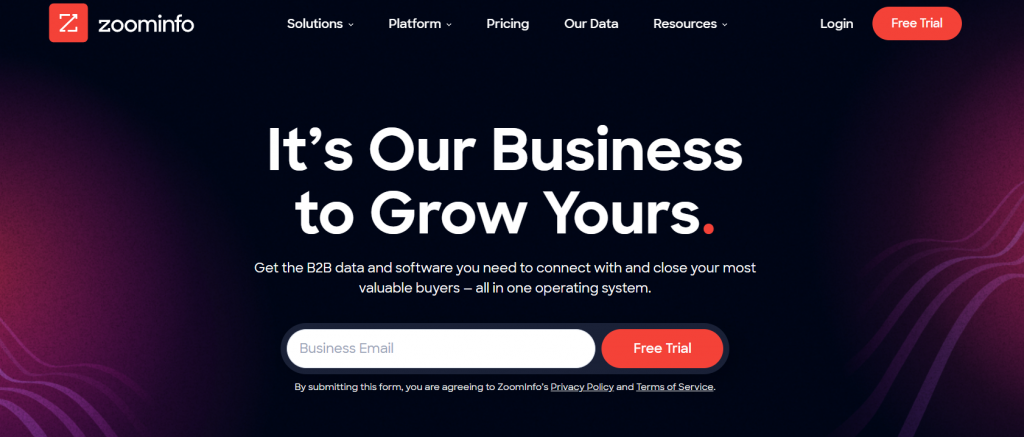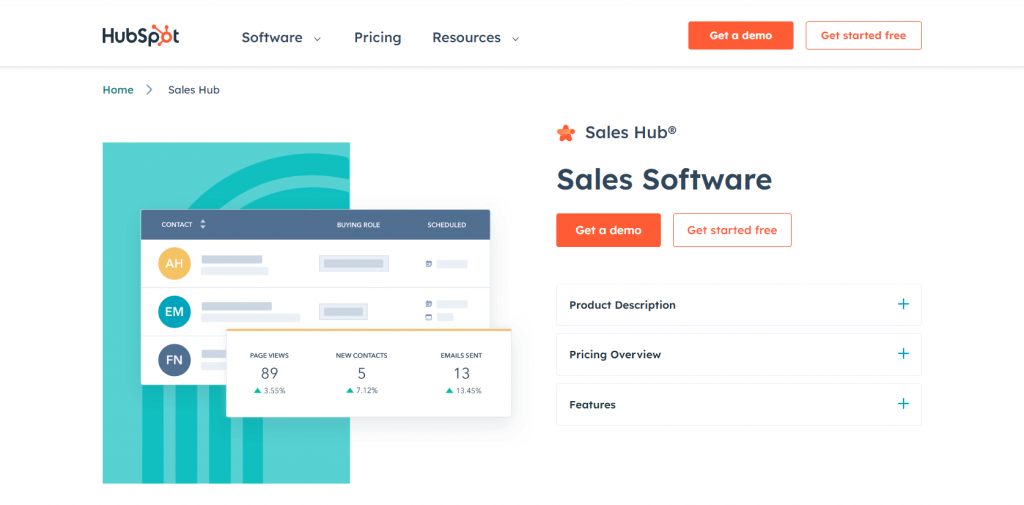- Products
- ProspectSQL/MQL list building with high levels of personalization, real-time data enrichment and prospect search
- Email FinderFind individual or bulk emails by entering the person & company name or domain
- Email VerifierVerify emails addresses individually, in bulk or through API, with 99% accuracy
- Clearout For SheetsVerify email addresses directly on Google Sheets with Clearout for sheets add-on
- ClearoutPhoneValidate phone numbers across 240+ countries in bulk, quick or real time validation Free Tools
- Disposable Email Checker
- Reverse LinkedIn Profile Lookup Tool
- Reverse Email Lookup Tool
- Email List Cleaner
- Resource
- Pricing
- Integrations
- Enterprise
- Login
How To Use Sales Intelligence For Better Prospecting
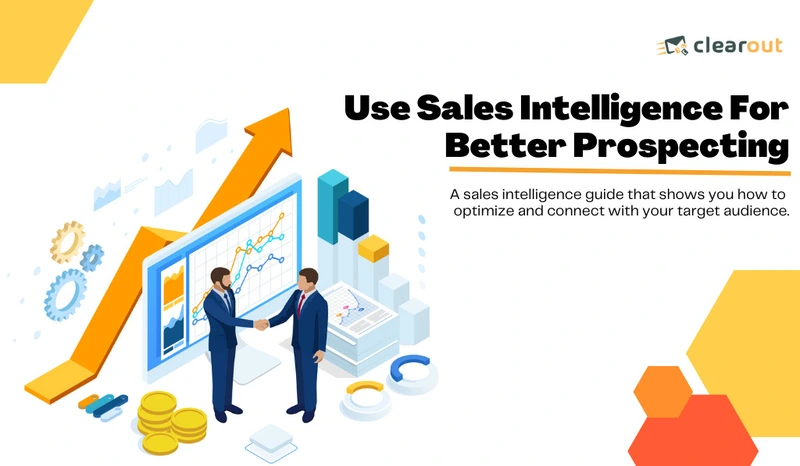
The emergence of AI has revolutionized the sales landscape, enhancing efficiency in the process, albeit with some challenges for sales reps and businesses.
Today, businesses can leverage a range of sales intelligence platforms and tools to gain a deeper understanding of their market's purchasing patterns. Armed with this knowledge, they can precisely target relevant audiences, identify ideal prospects, deliver tailored experiences, increase deal closures, and drive revenue growth.
Emergenresearch says the global sales intelligence market already reached USD 5.60 Billion in 2021, and its growth is largely influenced by the rise of AI-based solutions such as chatbots, tools for customer targeting, and data enrichment solutions.
Today, businesses can leverage a range of sales intelligence platforms and tools to gain a deeper understanding of their market's purchasing patterns. Armed with this knowledge, they can precisely target relevant audiences, identify ideal prospects, deliver tailored experiences, increase deal closures, and drive revenue growth.
Emergenresearch says the global sales intelligence market already reached USD 5.60 Billion in 2021, and its growth is largely influenced by the rise of AI-based solutions such as chatbots, tools for customer targeting, and data enrichment solutions.

As digital transformation continues to reshape the business landscape, sales intelligence has emerged as a critical tool for achieving success. If you haven't already embraced it, now is the time to do so. By leveraging sales intelligence, you can gain a deeper understanding of your market, optimize your sales strategy, and drive business growth.
Join us as we explore the transformative power of sales intelligence and its ability to supercharge your prospecting and sales processes, ultimately propelling your business toward success.
As we delve deeper, we'll also highlight the top sales intelligence tools available today—indispensable additions to your sales arsenal.
Join us as we explore the transformative power of sales intelligence and its ability to supercharge your prospecting and sales processes, ultimately propelling your business toward success.
As we delve deeper, we'll also highlight the top sales intelligence tools available today—indispensable additions to your sales arsenal.
What is Sales Intelligence?
Sales intelligence is the act of gathering and analyzing client data using different types of charts and graphs, which has the ability to enhance lead generation, boost conversions, close more deals, and provide you with a far more comprehensive and detailed understanding of the sales process. The ultimate goal is to ensure you have a better understanding of your prospects and existing clients, leading to a strong sales pipeline.
The sales intelligence data helps you learn more about customers' demand patterns, the duration of their purchasing processes, where they came from, the development of their personas, and much more. By integrating the data acquired from sales intelligence and insights from the accounts payable system, businesses can improve their financial processes and spur development. Accounting automation can offer useful insights into a company's financial health
Many sales people are unaware that they already possess the information necessary to discover new potential customers and gather insights about them. You don't need any specialized training or exclusive databases, just an understanding of how to utilize your available resources.
For example, you can conduct advanced searches on platforms like LinkedIn and Apollo.io to pinpoint the companies you want to target, discover their key clients or main competitors, and get access to their contact information.
Now that we know what sales intelligence is, let's take a look at the different ways in which sales intelligence data benefits your business.
The sales intelligence data helps you learn more about customers' demand patterns, the duration of their purchasing processes, where they came from, the development of their personas, and much more. By integrating the data acquired from sales intelligence and insights from the accounts payable system, businesses can improve their financial processes and spur development. Accounting automation can offer useful insights into a company's financial health
Many sales people are unaware that they already possess the information necessary to discover new potential customers and gather insights about them. You don't need any specialized training or exclusive databases, just an understanding of how to utilize your available resources.
For example, you can conduct advanced searches on platforms like LinkedIn and Apollo.io to pinpoint the companies you want to target, discover their key clients or main competitors, and get access to their contact information.
Now that we know what sales intelligence is, let's take a look at the different ways in which sales intelligence data benefits your business.
What Are the Benefits of Using Sales Intelligence?

Successful businesses use data to explain every micro-decision, and from those decisions, they gather more data, developing a continuous cycle of self-improvement. This includes improvements across revenue and production.
According to research, businesses that adopt data-driven sales and include data in their sales process are somewhere between 5% and 6% more lucrative.
Fundamentally, implementing sales intelligence is like a data-driven sales approach that uses analytics and data to speed up sales. This requires the sales teams to give more precedence to data collection in the entire process.
Here’s how sales intelligence helps your overall sales process and business-
According to research, businesses that adopt data-driven sales and include data in their sales process are somewhere between 5% and 6% more lucrative.
Fundamentally, implementing sales intelligence is like a data-driven sales approach that uses analytics and data to speed up sales. This requires the sales teams to give more precedence to data collection in the entire process.
Here’s how sales intelligence helps your overall sales process and business-
Learn About Your Market Potential
Get direct access to a wide range of prospects in your target market. Most companies just touch the tip of the iceberg during their conversations with their target audience. But with sales intelligence, you get a comprehensive perspective on your industry, ensuring that you don't miss any potential sales opportunities now or in the future.
Find Your Target Audience
Wouldn't it be fantastic to do away with the majority—or even all—of the extensive research you must conduct to determine what your target audience wants? With sales intelligence, it is feasible. It mixes static and dynamic data to make it simple for you to pinpoint your perfect client and approach them.
Identify Decision Makers
Sales intelligence helps you learn about who you are reaching out to. Keeping the best point of contact, i.e., the decision-makers, makes the process easier while helping you look more professional. Also, you save time by avoiding dealing with those who lack decision-making power or are merely uninterested in what you have to offer.
Convert Cold Call Into Warm Conversations
Sales intelligence helps you gain a better understanding of your prospects and their pain points than regular customer data alone. This enables you to provide a more personalized experience or solution to them, ultimately engaging them and turning your cold outreach emails or phone calls into a potential opportunity
Keep an Eye on Your Competitors
You can use sales intelligence tools to find out who your rivals are and to monitor their activities. You can track which trends they are following, perform gap analysis, and up-level your strategy to stay ahead of the competition.
How Does Sales Intelligence Work?
Sales intelligence platforms crawl millions of publicly accessible websites continuously, gathering relevant data and matching it to profiles in their database. And then it allows businesses to search. analyze, and evaluate the available sales data.
Different sales intelligence platforms operate in different ways, but most of them integrate seamlessly with your CRM or sales acceleration software.
When you incorporate sales intelligence into your B2B sales team, you can more effectively complete a variety of tasks.
Different sales intelligence platforms operate in different ways, but most of them integrate seamlessly with your CRM or sales acceleration software.
When you incorporate sales intelligence into your B2B sales team, you can more effectively complete a variety of tasks.
- Enriching and cleaning the database: Sales intelligence keeps your historical customer data updated and fills in any missing gaps.
- Trigger alerts: Sales intelligence provides real-time data on your prospects. If an event happens that you need to know about, it'll notify you.
- Personalization: You get more data about your prospect. And the more you know about a prospect, the more you can tailor the way you sell to them, yielding more conversions.
- Account prioritization: Sales intelligence enables you to segment prospects based on factors such as revenue potential, market size, or purchasing behavior. Prioritizing high-value accounts allows you to concentrate your efforts on the most promising opportunities, increasing your chances of success.
- Sales forecasting: Sales intelligence also helps in predicting future sales performance, costs, revenue, etc which can help you set short-term and long-term goals with better preparation.
- Lead generation: Sales intelligence technology assists you by generating and prioritizing lead lists for businesses. Furthermore, the majority of available sales intelligence tools assist you in tracking relevant company changes by alerting you, as a salesperson, to opportunities in your target companies and increasing B2B sales.
How Does Sales Intelligence Improve B2B Sales & Prospecting Process?
Making a Better ICP (Ideal Customer Profile)
No B2B company can succeed by trying to be everything to everyone. Companies must start by focusing on a niche (the narrower, the better) and dominating it until they can use it as a base to expand.
To make it work, sales and marketing teams should collaborate to develop an ideal customer profile (ICP), leveraging sales intelligence. You can use sales intelligence tools to find commonalities and create lists of target companies and individuals that fit your ICP by analyzing your current customer base.
For example, if your ICP is a product manager in a company with more than 50 employees, sales intelligence will generate a list of people who exactly fit the bill. It will also provide you with their phone numbers, email addresses, and other pertinent information.
Your marketing team can then warm them up with relevant, personalized content.
To make it work, sales and marketing teams should collaborate to develop an ideal customer profile (ICP), leveraging sales intelligence. You can use sales intelligence tools to find commonalities and create lists of target companies and individuals that fit your ICP by analyzing your current customer base.
For example, if your ICP is a product manager in a company with more than 50 employees, sales intelligence will generate a list of people who exactly fit the bill. It will also provide you with their phone numbers, email addresses, and other pertinent information.
Your marketing team can then warm them up with relevant, personalized content.
Better Engagement With Prospects
Getting directly into the minds of your buyers and understanding what drives their purchase decisions is one of the most important sales intelligence tactics. AI assists in understanding prospects' interests and needs. This data can be used to create more targeted sales outreach that will result in a sale.
It's important to remember that sales intelligence includes intent data, which provides insights into when customers are likely to be in the market for a specific product or service. This data can be extremely useful in sales for determining sales triggers or when customers are more likely to buy.
Sales intelligence tools can detect signs of interest in prospects by monitoring company websites, media outlets, social networks, and other online channels.
For example, a major redesign of a prospect's company website could indicate that the company is preparing for growth and may be open to new products or services.
These are hot leads on which your sales team can zero in and offer gentle nudges to get them to convert. You can send them behavior-based emails if you prefer a more targeted approach. This ultimately engages prospects better and results in more sales.
It's important to remember that sales intelligence includes intent data, which provides insights into when customers are likely to be in the market for a specific product or service. This data can be extremely useful in sales for determining sales triggers or when customers are more likely to buy.
Sales intelligence tools can detect signs of interest in prospects by monitoring company websites, media outlets, social networks, and other online channels.
For example, a major redesign of a prospect's company website could indicate that the company is preparing for growth and may be open to new products or services.
These are hot leads on which your sales team can zero in and offer gentle nudges to get them to convert. You can send them behavior-based emails if you prefer a more targeted approach. This ultimately engages prospects better and results in more sales.
Lead Scoring
Data obtained from sales intelligence tools can be used to rank leads and prioritize sales efforts. Businesses can identify when someone is interested in their products or services by tracking the behavior of potential customers, such as the pages they visit and the keywords they search for.
This information can then be used to score leads, with higher scores indicating a higher chance of a conversion. This allows sales teams to concentrate their efforts on the most promising prospects while also identifying cross-selling and upselling opportunities.
This information can then be used to score leads, with higher scores indicating a higher chance of a conversion. This allows sales teams to concentrate their efforts on the most promising prospects while also identifying cross-selling and upselling opportunities.
Recognize Cross-Selling and Up-Selling Opportunities
Cross-selling can increase your overall sales by about 20%, which increases your profits by 30%. Up-sells should be treated similarly.
Taking advantage of both of these opportunities with your current clients can aid in the development of a loyal customer base, which can help to sustain your bottom line.
Data from sales intelligence software allows you to focus on existing customers while still generating leads.
Customers emit powerful buying signals, and they most likely already exist in your platform — you just need to use them to ensure the user experience is improved each and every time.
Taking advantage of both of these opportunities with your current clients can aid in the development of a loyal customer base, which can help to sustain your bottom line.
Data from sales intelligence software allows you to focus on existing customers while still generating leads.
Customers emit powerful buying signals, and they most likely already exist in your platform — you just need to use them to ensure the user experience is improved each and every time.
Identifying Areas For Improvement
The sales intelligence tool provides insights into how well your marketing and sales strategies are performing. This allows you to see what works quickly and then experiment with ways to improve future performance.
For example, if sales intelligence indicates that a particular campaign is not producing results, leaders can modify it or try a different approach. Similarly, if sales are lower than expected, leaders can look into why and make changes to boost sales.
For example, if sales intelligence indicates that a particular campaign is not producing results, leaders can modify it or try a different approach. Similarly, if sales are lower than expected, leaders can look into why and make changes to boost sales.
Obtain Key Competitor Information
While one of your business goals may be to sell a large number of products or meet certain revenue targets, the fact remains that success is dependent on a variety of factors other than how much you sell and how much revenue you generate.
You must keep an eye on your competition in order to stay ahead of the game. Sales intelligence can provide you with important information. This type of information is important because it allows you to create a solid strategy to entice them away from your competitor and toward your brand.
You must keep an eye on your competition in order to stay ahead of the game. Sales intelligence can provide you with important information. This type of information is important because it allows you to create a solid strategy to entice them away from your competitor and toward your brand.

Sales Intelligence Software Tools: How Do They Work?
How do you efficiently find high-quality sales leads?
How do you reach out to them?
How do you nurture them?
All of these and more can be easily done using sales intelligence tools, which give you access to massive amounts of external data that you can combine with the existing data in your CRM to enrich and expand your prospect/client database and nurture them toward conversion.
How do you reach out to them?
How do you nurture them?
All of these and more can be easily done using sales intelligence tools, which give you access to massive amounts of external data that you can combine with the existing data in your CRM to enrich and expand your prospect/client database and nurture them toward conversion.
Here are the top 5 sales intelligence tools that make prospecting easier for you.
1. Clearout.io
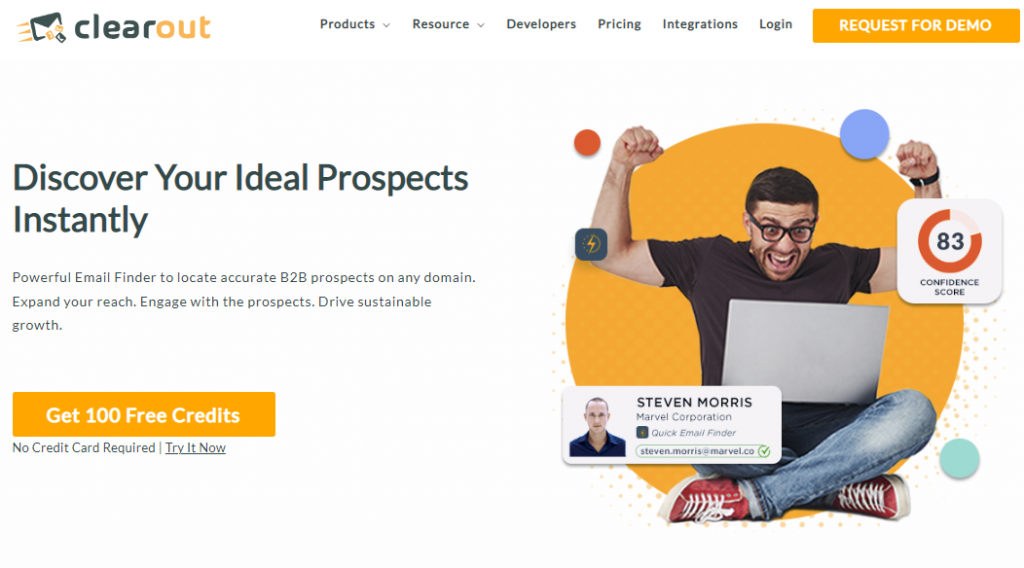
Marketers frequently wonder if the data they have gathered, the domains they are eyeing, and the prospects they are contacting are the right ones. Instead of shooting an arrow in the dark, tools like Clearout make it easier to capture only the right data that will help you reach out to the prospects efficiently and close more deals.
Here are the two ways in which you can use this AI-powered tool for prospecting, enriching your database with high-quality leads, and make most sense out of your data.
Prospecting for LinkedIn:
Clearout offers in-app prospecting facility and a Chrome extension for LinkedIn prospecting. The tool helps improve the quality and quantity of sales leads by using sales intelligence and advanced search options to find new opportunities and provide salespeople with the most relevant needs.
You can find leads based on profiles, experience, company, and using multiple filters that suit your requirements. You also get search templates and new filter options to match what your competitors are doing without missing out on possible business opportunities.
The interface is extremely intuitive and user friendly making it a breeze for the sales team to look up new leads. The extension lets you save your prospects’ details such as email address, phone numbers, geo-location, job details, etc directly from their LinkedIn profile, or search pages in bulk.
Here are the two ways in which you can use this AI-powered tool for prospecting, enriching your database with high-quality leads, and make most sense out of your data.
Prospecting for LinkedIn:
Clearout offers in-app prospecting facility and a Chrome extension for LinkedIn prospecting. The tool helps improve the quality and quantity of sales leads by using sales intelligence and advanced search options to find new opportunities and provide salespeople with the most relevant needs.
You can find leads based on profiles, experience, company, and using multiple filters that suit your requirements. You also get search templates and new filter options to match what your competitors are doing without missing out on possible business opportunities.
The interface is extremely intuitive and user friendly making it a breeze for the sales team to look up new leads. The extension lets you save your prospects’ details such as email address, phone numbers, geo-location, job details, etc directly from their LinkedIn profile, or search pages in bulk.
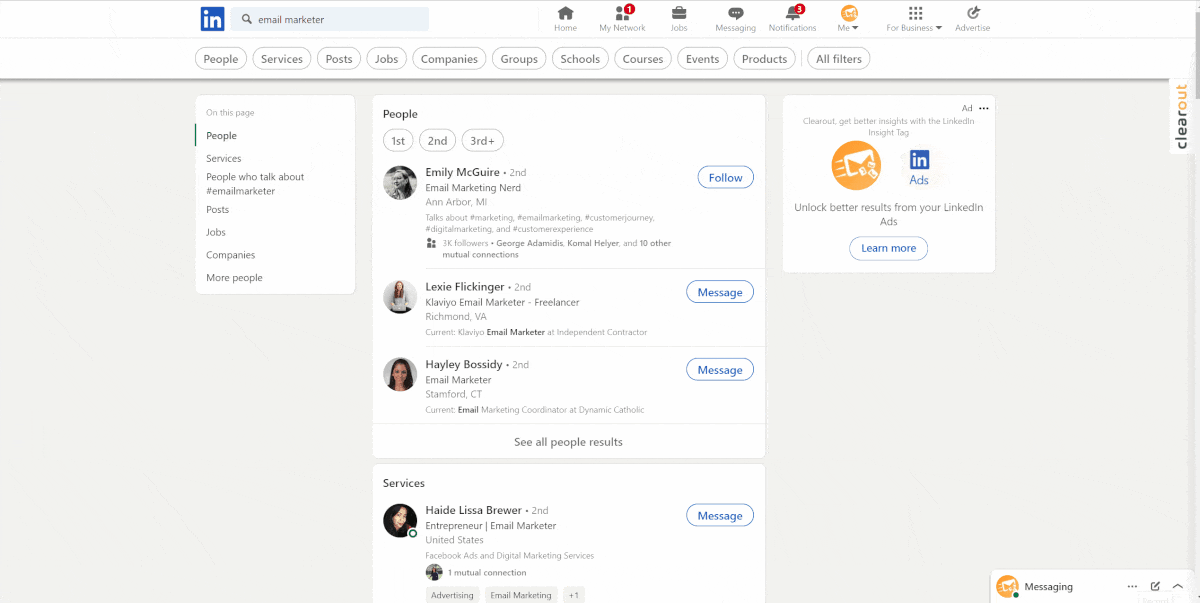
Read-> How to use the extension
Email Finder:
Clearout also offers a strong Email Finder that helps you connect with any person that can make a difference to your business.
The tool boosts your business’s sales by providing the corret email addresses and contact information you need within a few seconds and helping you build a solid database of prospects while strengthening your pipeline.
All it needs is the name of your prospect and their company name to fetch their email address within seconds. The results are backed up by AI-powered confidence scoring, which helps you understand the reliability of the lead.
Email Finder:
Clearout also offers a strong Email Finder that helps you connect with any person that can make a difference to your business.
The tool boosts your business’s sales by providing the corret email addresses and contact information you need within a few seconds and helping you build a solid database of prospects while strengthening your pipeline.
All it needs is the name of your prospect and their company name to fetch their email address within seconds. The results are backed up by AI-powered confidence scoring, which helps you understand the reliability of the lead.
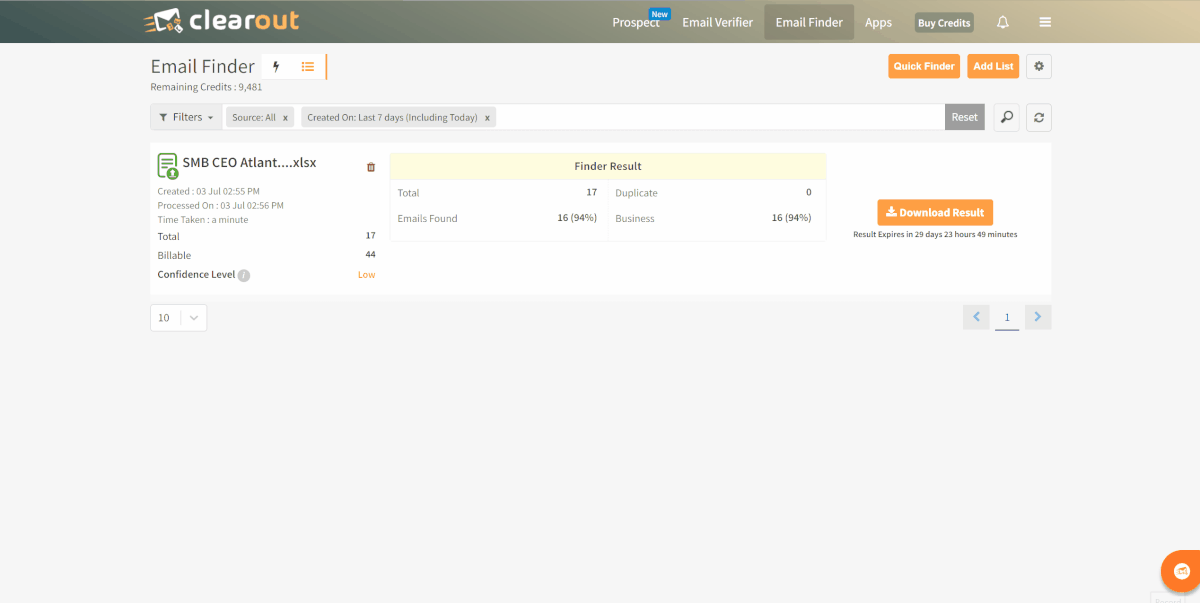
As Clearout also does email validation, all the data provided is pre-verified and run through 20+ checks, ensuring 99% accuracy. This means you will never have to worry about bad or spammy data or poor outreach campaign performance.
Clearout also supports real-time data validation on all your forms, pages, websites, Google Sheets, Chatbots, etc. through integrations, API, WP plugin, and JS widget. This ensures that all the leads that you are capturing from different sources are genuine and approachable.
Clearout also supports real-time data validation on all your forms, pages, websites, Google Sheets, Chatbots, etc. through integrations, API, WP plugin, and JS widget. This ensures that all the leads that you are capturing from different sources are genuine and approachable.
2. Apollo.io
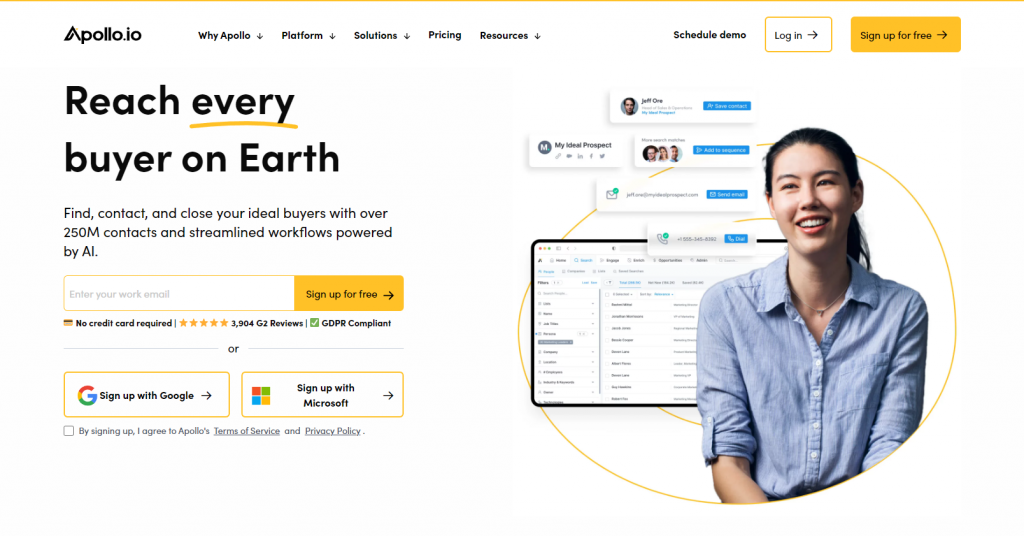
Apollo.io helps salespeople acquire their ideal clients by giving accurate information quickly. As a data-first sales intelligence platform, it caters more to lead creation and prospecting.
As a result, it provides a lot of data, such as email addresses, phone numbers, and more, about businesses and their decision-makers. It facilitates data enrichment by using automatic alerts when changes are made to client data,
The tool might also assist you in building an excellent list while guaranteeing that your database is up to date with key information about decision-makers.
The best thing about using Apollo.io is that the tool seamlessly integrates with Clearout email validation tool, making it easier to validate your database and avoid using any outdated or invalid lead data in your outreach campaigns.
As a result, it provides a lot of data, such as email addresses, phone numbers, and more, about businesses and their decision-makers. It facilitates data enrichment by using automatic alerts when changes are made to client data,
The tool might also assist you in building an excellent list while guaranteeing that your database is up to date with key information about decision-makers.
The best thing about using Apollo.io is that the tool seamlessly integrates with Clearout email validation tool, making it easier to validate your database and avoid using any outdated or invalid lead data in your outreach campaigns.
ZoomInfo is another sales intelligence database platform that ensures you always have the right contact information, whether it's for recent prospects or devoted longtime clients. This enables sales representatives to contact the right people without wasting their time with former coworkers.
You can build ICPs and target your prospects with messages that address their pain points better by using ZoomInfo's filtering to segment contact information. ZoomInfo also provides real-time visibility into funding rounds, other events, and new personnel.
You can build ICPs and target your prospects with messages that address their pain points better by using ZoomInfo's filtering to segment contact information. ZoomInfo also provides real-time visibility into funding rounds, other events, and new personnel.
To enhance and scale up your sales process, HubSpot created the HubSpot Sales Hub sales intelligence platform. With the tool, you can locate prospects and use extra features to move them through the buyer's journey.
You can use it to automate data entry, create email marketing and sales campaigns, and quickly contact more potential clients. Also, you can keep track of your KPIs and leads to determine exactly where they are in the buying cycle and when to approach them and close the deal.
You can use it to automate data entry, create email marketing and sales campaigns, and quickly contact more potential clients. Also, you can keep track of your KPIs and leads to determine exactly where they are in the buying cycle and when to approach them and close the deal.
5. LeadSquared
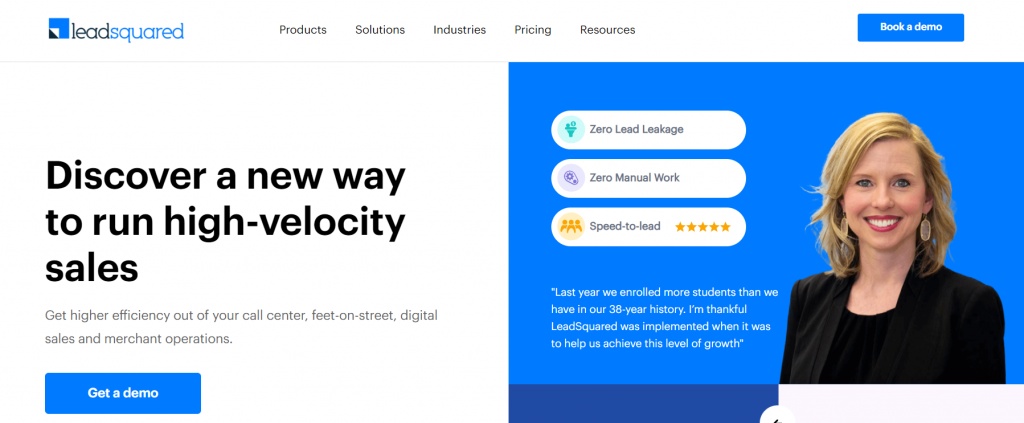
LeadSquared allows you to categorize leads based on company size, industry, region, job title, and so on. After that, you can send relevant content to these target groups. Furthermore, the tool allows you to create a dynamic list so that whenever a new lead enters the system, your targeted marketing list is automatically updated.
Aside from that, LeadSquared allows you to create trigger-based campaigns across multiple channels such as email, SMS, and WhatsApp. Prebuilt templates are available in an easily accessible content library. It also allows you to score leads based on their interactions with nurturing activities and provides campaign analytics.
Aside from that, LeadSquared allows you to create trigger-based campaigns across multiple channels such as email, SMS, and WhatsApp. Prebuilt templates are available in an easily accessible content library. It also allows you to score leads based on their interactions with nurturing activities and provides campaign analytics.
Close More Deals With Sales Intelligence Data!
Data is the fuel that drives sales intelligence.
The collected information should be as precise as possible. Incorrect data will only waste your salespeople's time and reduce their effectiveness.
To get the most out of your sales intelligence platform, you need the best data available - data that is rich, accurate, and up-to-date. This is why using data validation & sales intelligence is a must to enhance your sales prospecting process and close more deals.
With the right information, you will be able to learn much more about your prospects than just a contact's name and job title. You can obtain their work email address, mobile phone number, and other information.
The collected information should be as precise as possible. Incorrect data will only waste your salespeople's time and reduce their effectiveness.
To get the most out of your sales intelligence platform, you need the best data available - data that is rich, accurate, and up-to-date. This is why using data validation & sales intelligence is a must to enhance your sales prospecting process and close more deals.
With the right information, you will be able to learn much more about your prospects than just a contact's name and job title. You can obtain their work email address, mobile phone number, and other information.
Recent Posts
15 Jul 2025
8 ActiveCampaign User Scenarios and Ways to Optimize Them
Check out the common ActiveCampaign user scenarios and queries, along with optimization solutions to ...
01 Jul 2025
Best Zoho CRM Integrations for Sales & Marketing in 2025
Discover the top Zoho CRM integrations in 2025 categorized by use case. Explore how each tool's key ...
01 Jul 2025
Sales Automation in 2025: The Guide to Close More Deals Faster
Struggling with manual sales workflows? Follow this guide to explore the sales automation use cases, ...
25 Jun 2025
Top 6 Email Finder APIs in 2025 for All Use Cases
Looking for a reliable Email Finder API? Explore the top 6 email finder APIs of 2025—compare key fea ...
17 Jun 2025
Top 10 Email Spam Checker Tools Tested & Reviewed (2025)
Check out the top 10 email spam checker tools to avoid junk folders. Compare features, ratings & use ...
Prospecting ,Email Finder & Email Verification Service
Prospecting ,Email Finder & Email Verification Service
Expand your reach by discovering and verifying the ideal prospects.
Sign up & get 100 free credits | No Credit Card required



